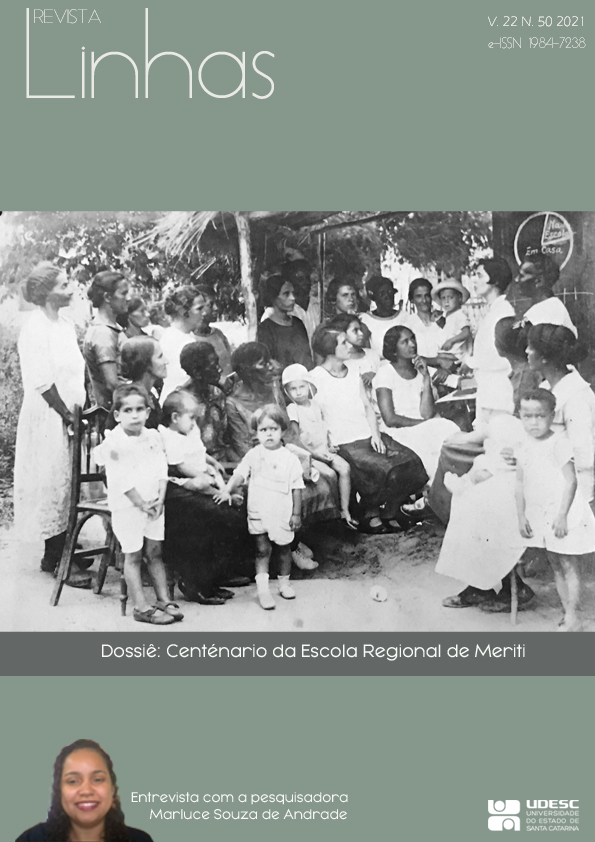Sarau Janelas Floridas: (re)existências na educação e na arte
DOI:
https://doi.org/10.5965/1984723822502021191Palabras clave:
educação pública, arte, experiência, acontecimento e narrativaResumen
Tomamos as Janelas Floridas, do concurso para Sarau de (Re)existência com a força da arte, como elemento provocador e potência de luta pela Educação Pública com cotidianos escolares contra os processos de gentrificação dos espaços urbanos. O que podem a alegria, a brincadeira e os afetos contra a aniquilação do capital? O Sarau Janelas Floridas surge nessa resposta, usa a arte para fortalecer a luta contra a construção de um shopping que ameaça a estrutura física e a existência da E. M. Dr. Álvaro Alberto, a Regional de Meriti, ou a Escola Mate com Angu. Expressão das vozes e experiências da escola e atores da sociedade civil que se reúnem num grito, num choro, num riso, numa explosão de alegria. O movimento do Sarau Janelas Floridas desenhou a experiência como trajeto de singularização. Nascido da mobilização da educação e da arte e de diferentes instâncias, sujeitos e instituições e acolhido pela comunidade escolar como movimento, se produz como acontecimento. Tomamos, no plano da ação, a experiência segundo Dewey, ao afirmar a via estética como concretização de uma tensão existencial, um ato efetuado e consumado de ações e percepções que permitem uma singularidade: aquele acontecimento, aquele dia que não se perde na dispersão dos fluxos do vivido. No plano das reflexões, recorremos a Benjamim e seu conceito de experiência como constituição política, o ato de contar a sua história é efetuá-la novamente e, ouvir a narrativa, o ato de incorporar ao repertório do vivente uma nova saída, uma escapatória, uma porosidade.
Palavras-chave: educação pública; arte; experiência; acontecimento e narrativa.
Descargas
Citas
AGAMBEN, Giorgio. O tempo que resta: um comentário à carta aos romanos. Belo Horizonte: Autêntica, 2016.
AUGÉ, MARC. O fetiche e seu objeto: abordagem etnológica. In: AUGÉ, Marc et al. O objeto em psicanálise:o fetiche, o corpo, a criança, a ciência. Campinas: Papirus, 1989.
BAUDELAIRE, Charles. Poesia e prosa: volume único. Rio de Janeiro: Nova Aguillar, 1995.
BENJAMIN, Walter. Estética e sociologia da arte.Belo Horizonte. Autêntica editora, 2017.
CERTEAU, Michel de. A invenção do cotidiano. Petrópolis: Vozes, 1994.
CRARY, Jonathan. Capitalismo tardio e os fins do sonho.São Paulo: UBU Editora, 2016.
DELEUZE, Gilles; GUATTARI, FÉLIX. Mil Platôs: capitalismo e esquizofrenia. 2. São Paulo: Ed. 34, 1995.
DELIGNY, Fernand. Os vagabundos eficazes: operários, artistas, revolucionários: educadores. São Paulo: N-1 edições, 2018.
DELIGNY, Fernand. O Aracniano e outros textos.São Paulo: N-1 edições, 2015.
DEWEY, John. A arte como experiência. São Paulo: Martins Fontes, 2010.
EVARISTO, Conceição. Olhos d’agua.Rio de Janeiro: Pallas, 2016.
GUATTARI, FÉLIX. Líneas de fuga: por outro mundo de posibles. Cuidad Autónoma de Buenos Aires: Cactus, 2013.
KRENAK, Ailton. A vida não é útil.São Paulo: Companhia das Letras, 2020.
O DIA. Escola 'Mate com Angu' completa 100 anos em Duque de Caxias, 2021. Disponível em: https://odia.ig.com.br/duque-de-caxias/2021/02/6091735-escola-mate-com-angu-completa-100-anos-em-duque-de-caxias.html. Acesso em 30 out. 2021.
MASSUMI, Brian. O que os animais nos ensinam sobre política. São Paulo: N-1 edições, 2017.
MBEMBE, Achille. Necropolítica:biopoder, soberania, estado de exceção, política da morte. São Paulo: N-1 edições, 2018.
MIGNOT, Ana Chrystina Venancio.Viajar para legitimar: Armanda Álvaro Alberto na Comissão de Intercâmbio Brasil-Uruguai (1931).Revista Brasileira de História da Educação,cidade, n. 22, p. 43-64, jan./abr. 2010.
MIGNOT, Ana Chrystina Venancio. Armanda Alberto. Recife: Fundação Joaquim Nabuco, Editora Massangana, 2010. (Coleção Educadores).
QUINTANA, Mário. Sapato florido. São Paulo: Globo, 2005.
RICOEUR, Paul. La metáfora viva. Madrid: Ediciones Trotta, 2001.
RICOEUR, Paul. La memoria, la historia, el olvido. Madrid: Ediciones Trotta, 2003.
SOURIAU, Étiene. Diferentes modos de existência.São Paulo: n-1 edições, 2020.
SANTOS,André da Rocha.Revitalização para quem?: política urbana e gentrificação no centro de Santos. Caderno Metrópole,São Paulo, v. 16, n. 32, p. 587-607, nov. 2014. Dossiê: desenvolvimento desigual e gentrificação da cidade contemporânea.
TRINDADE, Solano. Cantares ao meu povo.São Paulo: Editora Brasiliense, 1981.
VIEIRA, José Luandino. A cidade e a infância: contos. São Paulo: Companhia das Letras, 2007.
Descargas
Publicado
Cómo citar
Número
Sección
Licencia
Derechos de autor 2021 Revista Linhas

Esta obra está bajo una licencia internacional Creative Commons Atribución-NoComercial-SinDerivadas 4.0.
Os artigos publicados pela revista são de uso gratuito, destinados a aplicações educacionais e não comerciais. Os direitos autorais são todos cedidos à revista. Os artigos cujos autores são identificados representam a expressão do ponto de vista de seus autores e não a posição oficial da Revista Linhas ou do Programa de Pós-Graduação em Educação da Universidade do Estado de Santa Catarina.

A Revista Linhas está licenciada com uma Licença Creative Commons - Atribuição-NãoComercial-SemDerivações 4.0 Internacional.


